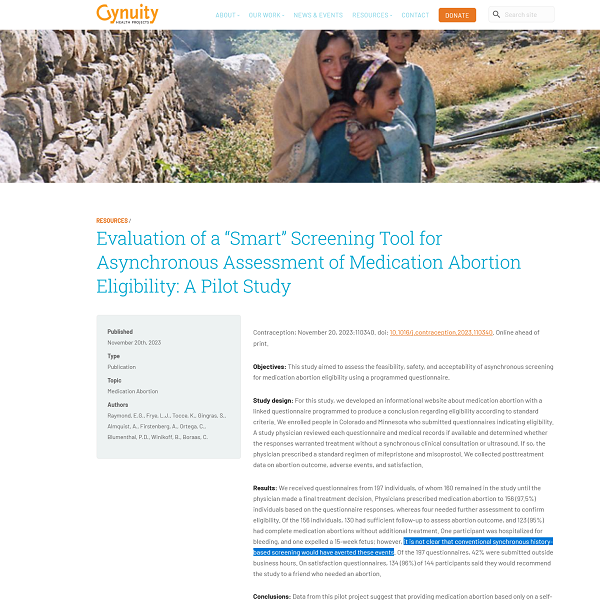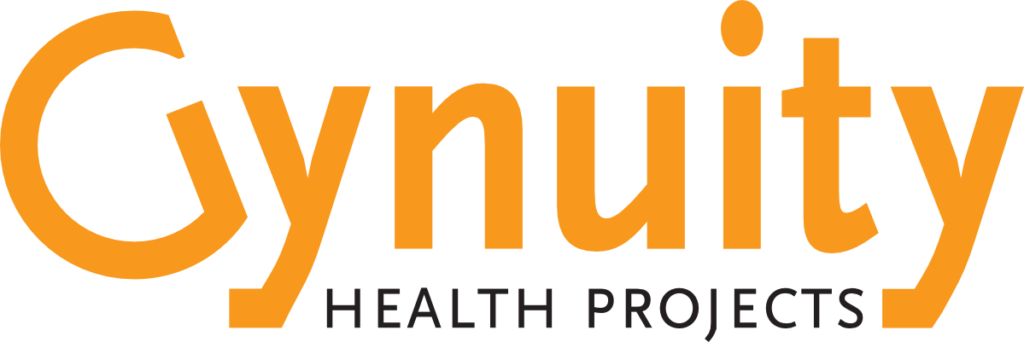
Evaluation of a “Smart” Screening Tool for Asynchronous Assessment of Medication Abortion Eligibility: A Pilot Study
 Providing medication abortion based only on a self-administered, programmed questionnaire is likely to be effective, safe, efficient, and acceptable, according to the findings from a pilot demonstration study implemented at two Planned Parenthood affiliates in Colorado and Minnesota. Building on favorable results from prior studies on the safety of medication abortion services using history-based screening, remote counseling via telemedicine, and abortion pills sent by mail, our latest study introduced additional ways of streamlining the process using methods like email, texting, and online forms. For this study, we developed an informational website about medication abortion with a linked questionnaire programmed to produce a conclusion regarding eligibility according to standard criteria. The small study enrolled people in Colorado and Minnesota who submitted questionnaires indicating eligibility for medication abortion. A physician reviewed each questionnaire and, if available, medical records and determined whether the responses allowed treatment without a real-time clinical consultation or ultrasound. If so, the physician prescribed a standard regimen of mifepristone and misoprostol, which were mailed or collected in person together with analgesics, antiemetics, a urine pregnancy test, and instructions. Non-eligible individuals were referred to non-study staff for alternative care. We collected posttreatment data on abortion outcome, adverse events, and satisfaction.
Providing medication abortion based only on a self-administered, programmed questionnaire is likely to be effective, safe, efficient, and acceptable, according to the findings from a pilot demonstration study implemented at two Planned Parenthood affiliates in Colorado and Minnesota. Building on favorable results from prior studies on the safety of medication abortion services using history-based screening, remote counseling via telemedicine, and abortion pills sent by mail, our latest study introduced additional ways of streamlining the process using methods like email, texting, and online forms. For this study, we developed an informational website about medication abortion with a linked questionnaire programmed to produce a conclusion regarding eligibility according to standard criteria. The small study enrolled people in Colorado and Minnesota who submitted questionnaires indicating eligibility for medication abortion. A physician reviewed each questionnaire and, if available, medical records and determined whether the responses allowed treatment without a real-time clinical consultation or ultrasound. If so, the physician prescribed a standard regimen of mifepristone and misoprostol, which were mailed or collected in person together with analgesics, antiemetics, a urine pregnancy test, and instructions. Non-eligible individuals were referred to non-study staff for alternative care. We collected posttreatment data on abortion outcome, adverse events, and satisfaction.
KEY FINDINGS
- We received completed questionnaires from 197 individuals, of whom 160 remained in the study until the physician made a final treatment decision.
- Physicians prescribed medication abortion to 156 (97.5%) individuals based on the questionnaire responses. Four people needed further assessment to confirm eligibility.
- In 140 cases (90%), the medications were sent by mail; 16 people opted to pick them up in person at the health center.
- Of the 156 individuals, 130 had sufficient follow-up to assess abortion outcome, and 123 (95%) had complete medication abortions without additional treatment.
- One person was hospitalized for bleeding, and one expelled a 15-week fetus. It is not clear that conventional synchronous history-based screening would have averted these events.
- Nearly half (42%) of the 197 questionnaires were submitted outside business hours.
- The majority of participants (134 out of 144) said they would recommend the study to a friend who needed an abortion.
IMPLICATIONS A programmed self-administered patient questionnaire to assess eligibility for medication abortion could reduce the cost of the service, augment clinic efficiency, improve quality of care, and enhance access to abortion.
ACKNOWLEDGMENTS
We thank our partners and close collaborators—Stanford University, Planned Parenthood North Central States, and Planned Parenthood of the Rocky Mountains— and the individuals who consented to take part in the study. We are grateful to Stanford Impact Labs, the William & Flora Hewlett Foundation, and the David & Lucile Packard Foundation for supporting this work.
ARTICLE
E.G. Raymond, L.J. Frye, K. Tocce, S. Gingras, A. Almquist, A. Firstenberg, C. Ortega, P.D. Blumenthal, B. Winikoff, C. Boraas Evaluation of a “Smart” Screening Tool for Asynchronous Assessment of
Medication Abortion Eligibility: A Pilot Study; Contraception:




















